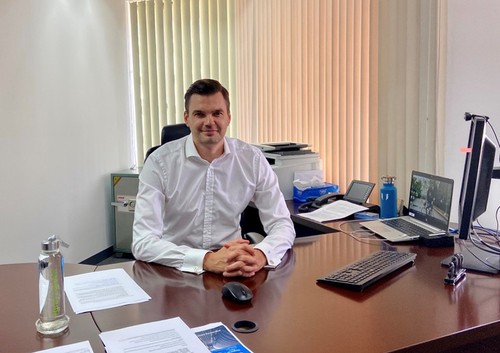Schöneck: Among many reasons, the most important thing is Vietnam is one of the 5 largest cement producers in the world after China, the US, India, and Turkey. It‘s a big market in Southeast Asia. Second, we already had an office in Vietnam for 10 years with 85 employees, who over the past year contributed greatly to the company's operations. In Vietnam we have a big automation center to research cement operations worldwide. Another important point is that Vietnam has a lot of potential in human resources with highly trained employees. We want to reach out to all of that and to the customers in Southeast Asia and beyond for solutions for the whole of Asia.
 Mr. Lukas Schöneck, TIS Director in Vietnam (Photo: Thyssenkrupp Industrial Solutions) Mr. Lukas Schöneck, TIS Director in Vietnam (Photo: Thyssenkrupp Industrial Solutions)
|
What are Thyssenkrupp's most outstanding achievements in its decades-long cooperation with Vietnamese partners?
In the 1960s Thyssenkrupp Industrial Solutions AG sold Vietnam the first cement production line through its subsidiary. Cement is our core business in Vietnam. In 1976 we provided the second line for the Ha Tien cement factory. In 1994 we opened a representative office in Vietnam and officially expanded it six years later. Over the past 40 years we have provided 6 cement production lines for Vietnam, and 4 chemical research facilities, among other equipment and services.
Have you got any plans for human resource training in Vietnam?
Since 2010 we have strengthened the training of human resources in Vietnam. As a result, the Vietnamese team has done all the missions well. Over the past decade, our engineers in Hanoi have worked more than 1 million hours on projects around the world. Usually our experts from Germany come to Vietnam for training for a year, and a number of Vietnamese engineers are sent to Germany to study for 2 to 3 years. We plan to bring experts from Germany to teach technology, service, and modernization and have assigned experts from Germany, Singapore, and Thailand to Vietnam to build a knowledge center in Hanoi. These experts will be responsible for training local employees to fullfil a set goal –that within 3 years the staff in Hanoi can be in charge of the projects in Vietnam and throughout Southeast Asia.
Vietnam has signed a Free Trade Agreement with the EU which is expected to help Vietnam attract more foreign investment. What will TIS do to increase its competitiveness in Vietnam with more and more foreign investors coming to Vietnam?
We’ll consolidate the existing cooperation with Vietnamese partners, further develop the automation center in Vietnam to create the technologies at more competitive prices than the inventions in Germany, and make the most of local human resources to realize projects in the region and the ideas of regional human resources to serve customers in the locality. This will help us provide products, services, and technologies at a more competitive price.
Thank you, Mr. Lukas Schöneck, TIS Director in Vietnam, for granting VOV this interview.